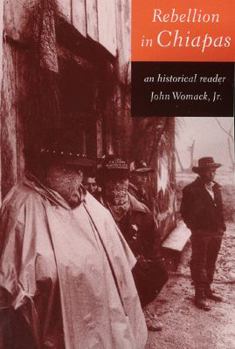Rebellion in Chiapas: An Historical Reader
Carlos Fuentes writes, John Womack has an uncanny feeling for the infinitely complex strains of Mexico. Here, Woack examines the conflict in Chiapas in light of 500 years of struggle and uneasy accomodation between the region's Maya population and the Spanish conquerors and ladino landowners. Rebellion in Chiapas opens with a major new essay examining the Zapatista revolt and chronicling the attempts at a negotiated peace. It goes on to reveal...
Format:Paperback
Language:English
ISBN:1565844521
ISBN13:9781565844520
Release Date:March 1999
Publisher:New Press
Length:372 Pages
Weight:1.27 lbs.
Dimensions:0.8" x 6.1" x 9.2"
Customer Reviews
5 ratings
Thorough and Disturbing
Published by Thriftbooks.com User , 18 years ago
I wish only to respond to some statements made by an earlier reviewer. (1) Contrary to the impression given by that reviewer, Womack gives a very thorough account of the centuries of evils inflicted by the dominant society upon the Indigenous here. He in no way fails to explain why at least some of them felt that they had no alternative but to rebel, and he states that the awful conditions here (I live in Chiapas) justified their rebellion. (2) "Slash and burn" is no buzzword: it is unfortunately an entirely accurate description of farming practices that have nearly destroyed the Lancandon Jungle. People familiar with Chiapas have long recognized that this technique, which is born of ignorance and desperation, is unnecessary here. (See Una Tierra para Sembrar Suenos, by Jan de Vos.) One needn't live very long in Chiapas (I've been here 5 years) in order to realize that contrary to myths promoted by romanticists, the Indigenous really are not very good farmers. The Indigenous themselves admit this, recognizing that their methods are unsustainable and leading them to ruin. That is one reason why they so desperately need government recognition of their titles to the land they occupy, so that they may become eligible for assistance that will enable them to implement long-recognized strategies to use their present land and the remnants of the Jungle sustainably.
Brilliant blend of historical and contemporary issues
Published by Thriftbooks.com User , 21 years ago
Reaching into the depths of Mexican colonial history, Womack explores the historical roots of dissatisfaction in Chiapas. His examination of the background of the rebellion provides a useful lens through which all of the major events of the Mexican past can be seen as precursors to the 1994 uprising. While this type of analysis may border on overdetermination, Womack makes certain to provide an account that properly considers the rebellion a modern conflict. He concludes that three factors are particularly significant: the transformation of material life in Chiapas, the entrance of 'outsiders' into the political life of Mexico's rural regions, and the ascension of a bishop, Samuel Ruiz, who continued to exemplify the socially-oriented Catholic Church of the 1960s in the altogether different times of the 1990s. Womack's book is especially effective at tracing these final two trends. The combination of the leftist ideology brought into the rural Chiapas by Marxist and Maoist groups, along with a cleric that encouraged his parishioners to defend their rights, was instrumental in bringing about the rebellion. Womack engages in this kind of analysis time and again in Rebellion in Chiapas, making his historical study of a conflict that has yet to be resolved more relevant than ever.
Nunca Mas Mundo Sin Nosotros
Published by Thriftbooks.com User , 24 years ago
Rebellion In Chiapas is extremely useful as a sourcebook, but, although John Womack is sympathetic to the Zapatista cause, he nevertheless misses the fundamental tenet of Zapatismo - to whit, the vile nature of the system which is the ultimate cause of the rebellion. In addition, Mr. Womack uses terms like "slash-and-burn" to describe the agricultural methods used by indigenous farmers in Chiapas, without mentioning the fact that the jungle soil to which they have been driven is, as most farmers could easily tell you, about the worst soil possible for farming. So-called "slash-and-burn" is about the only possible alternative on such soil, but the term leads the reader to believe that the indigenous people are poor farmers. They are not. They are simply desparate.Generally a decent book, but be careful of establishment buzzwords like "slash-and-burn".
a very comprehensive primary source account of the situation
Published by Thriftbooks.com User , 24 years ago
this is a very good book on the chiapas, it starts with a 60 page essay narrating the birth of the conflict, it goes very far back and very deep in detail, then the rest of the book is devoted to primary source documents that are relevant in some way, it has a couple of teh ezln's communiques by subcommandante marcos, very dense, it really is a historical reader, very complete and covers the whole history, good book,
An excellent collection of hard-to-find documents.
Published by Thriftbooks.com User , 25 years ago
Rebellion in Chiapas is a good counterpart to Neil Harvey's The Chiapas Rebellion. Womack's introductory essay, essentially a compact book about the history of Chiapas itself, is careful, thoughtful and thorough. Very Womack. The readings he have selected are interesting to read and very important to any understanding of the rebellion, and they are very hard to find even for people who have tried to keep up with the crisis in Chiapas. Womack's comments on each selection are nearly as interesting as the documents themselves. For anyone interested in Chiapas, this book is essential.






